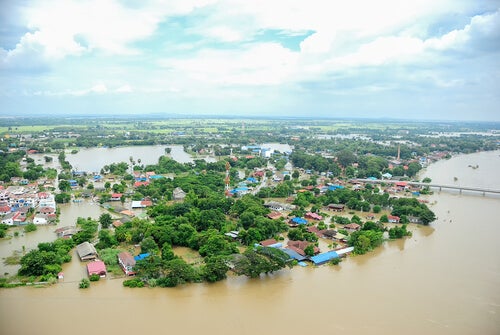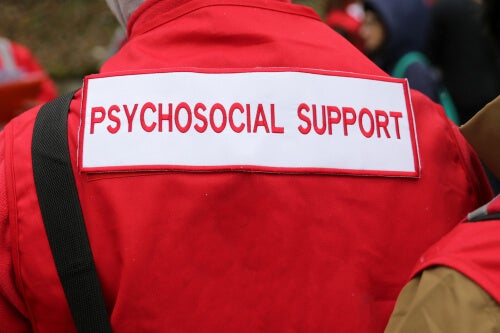Psychosocial Support after Disasters

The design and goal of psychosocial support during and after disasters intend to minimize the psychological and social consequences of a catastrophic event on people and their communities.
Psychosocial intervention teams are usually comprised of coordinators, psychologists, and volunteers with specific types of training. They work at two different moments in time.
The first one is after a disaster. The second one before it happens through preventive work that seeks to reduce any possible vulnerable points of a given community. But what exactly is a disaster?
Definition of disaster
Disasters are both natural and human-made events that lead to a common threat that’s so great, it exceeds an individual’s ability to react and respond to it.
Scientific evidence indicates that natural disasters don’t leave behind as many psychological consequences as those provoked by humans. Nevertheless, both have many repercussions and can devastate an entire community, which is why they lead to suffering in individuals.
Post-disaster psychosocial support in communities

After a catastrophe, several variables can influence either the improvement or worsening of a given emergency situation. The community needs to be able to rebuild what they’ve lost from a psychosocial perspective. Thus, they must:
- Have a sense of belonging. The community mustn’t feel like they’re victims but survivors instead.
- Work towards a social climate. This is related to recognition and validation regarding the suffering that a community experienced.
- Retain control over one’s life to avoid helplessness and dependence.
- Recover their old routine to reduce the feeling of uncertainty.
- Develop instrumental elements. Here, we’re referring to dignity and social support.
- Know they have future prospects.
Psychosocial support for people
Immediately upon arrival to a disaster area, psychosocial support teams must take action to help anyone whose psychological resources don’t allow them to cope with what just happened. Thus, they’ll have priority.
This is commonly known as psychological first aid. It’s quite intense and short-lived and doesn’t have to respond to a direct request from the affected person. The teams can follow their own initiative and offer to help. However, such actions must follow seven principles:
- Security. To begin, the teams must ensure the physical integrity of those affected.
- Proximity. They must carry out any psychosocial support in environments close to the disaster site.
- Immediacy. This is a very important factor to prevent chronic symptoms.
- Normalization. Broadcast the survivor who’s experiencing normal reactions to abnormal situations.
- Activate. Implement the strategies each individual has for confronting situations. It’s also important to activate their social networks so that these become support and help prevent the worsening of a situation.
- Simplicity. They should give information in a simple and brief way so the people can process it better.
- Flexibility. Psychosocial care must adapt to specific situations, modifying the pre-established strategies if needed.
What to do if you want to help during a disaster

When an event of this magnitude happens, tending to a survivor without any training and references could be a goal you don’t know how to reach. For instance, what’s the right thing to say? What should you do? What’s inappropriate?
Here are some of the main recommendations for psychosocial support:
- First of all, don’t promise anything you can’t do.
- Respect and value silence.
- Remain as calm as you can.
- Allow and validate any emocional expressions from survivors.
- Respect the religious beliefs of each individual or lack of beliefs thereof.
- Don’t force an affected person to do something they don’t want to do at any given moment.
- Avoid confrontations with any affected person.
- Don’t lecture or instruct an affected party about the event. Instead, encourage them to enter into a dialogue at a transcendental level.
- Listen if a survivor wants to talk.
- Finally, don’t dismiss threats of suicide or homicide for any reason.
As a final reflection, when you think of a disaster, you usually take into account an event that occurs within a limited time-space. Generally, an earthquake, a volcano eruption, a traffic accident, a major industrial accident, etc. However, this isn’t always the case. A disaster can also be a long war or famine or any phenomenon that goes on for a while.
Thus, the work of psychosocial support teams during disasters isn’t only to offer support at specific times. In many cases, this kind of intervention must continue as needed until the community goes back to the same functional level it had before the disaster.
All cited sources were thoroughly reviewed by our team to ensure their quality, reliability, currency, and validity. The bibliography of this article was considered reliable and of academic or scientific accuracy.
- Baloian, I., Chia, E., Cornejo, C., & Paverini, C. (2007). Intervención psicosocial en situaciones de emergencia y desastres: guía para el primer apoyo psicológico.
- Pérez-Sales, P. (2004). Intervención en catástrofes desde un enfoque psicosocial y comunitario. Madrid: Átopos, 1, 5-16.
- https://www.unincca.edu.co/permanencia/primerosauxilios/textos%20de%20ayuda/texto1.pdf
This text is provided for informational purposes only and does not replace consultation with a professional. If in doubt, consult your specialist.








